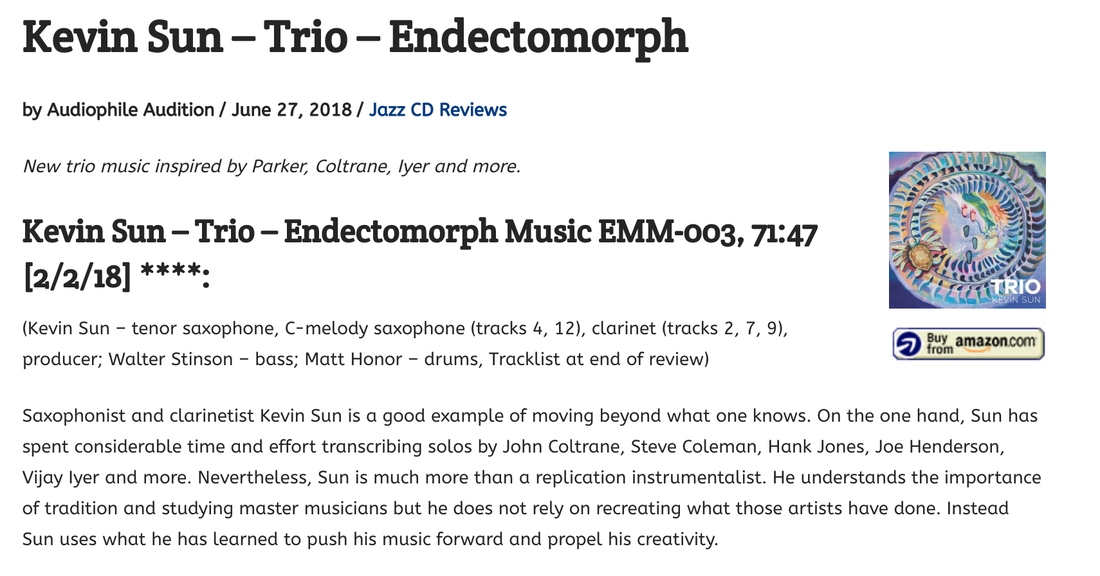endectomorph music
Menu
Endectoblog
"Who says modern jazz practitioners can’t have some fun with some jazz history?" Audiophile Audition gave Trio four stars. Read the original review by Doug Simpson here (full text below). * * * * * Kevin Sun – Trio – Endectomorph Music EMM-003, 71:47 [2/2/18] **** June 27, 2018 Audiophile Audition Saxophonist and clarinetist Kevin Sun is a good example of moving beyond what one knows. On the one hand, Sun has spent considerable time and effort transcribing solos by John Coltrane, Steve Coleman, Hank Jones, Joe Henderson, Vijay Iyer and more. Nevertheless, Sun is much more than a replication instrumentalist. He understands the importance of tradition and studying master musicians but he does not rely on recreating what those artists have done. Instead Sun uses what he has learned to push his music forward and propel his creativity. Throughout his debut as leader—the 72-minute, 14-track Trio—Sun displays his imaginative performance style, his compositional skills and his group improvisational perception. The Brooklyn-based Sun is also a member of the quartet Great on Paper and the chordless quartet Earprint. He studied composition with Miguel Zenón and John Hollenbeck, and cites Coleman, Iyer, Miles Okazaki, Henry Threadgill, Steve Lehman and Turner as influences. Supporting Sun is bassist Walter Stinson (see Adam O’Farrill and the Parker tribute ensemble Early Bird Jazz Band) and drummer Matt Honor (whose background includes the modern jazz collective Cowboys & Frenchmen). The trio open with the seven-minute “Transaccidentation” (the title refers to a Christian medieval theological doctrine). This abstract and experiential piece utilizes fragments of harmonic ideas from Parker’s “Confirmation” as building blocks. The churning arrangement is in 15/8 time. Sun supplies agile pentatonic figures via tenor sax, slips in unanticipated playfulness and broad melodic intervals. Sun also showcases his acuity with re-transforming past jazz music elements on the bop-paced “Three Ravens,” which is constructed around a negative reharmonization of the standard “Lover.” This fierce-swinging tune evokes early Steve Lacy and Lenny Tristano with its free-thinking bop inclination. During “Three Ravens” Sun plunges into some fiery improvisations and later Honor snags the spotlight for some tricky percussive soloing.
Sun develops a different tonality on three cuts where he employs clarinet. First up is the supple and relatively brief “Loading Screen,” which has a speculative characteristic and thus doesn’t mirror previous jazz clarinet material. Clarinet is also found on the lengthiest number, the 12-minute “Air Purifier.” The title deliberately tips a hat to Parker’s “Air Conditioning” but the arrangement is closer to Charles Mingus’ or Paul Bley’s conceptualism. Sun begins with elongated, flowing arpeggios and sudden chromatic utterances. Gradually Sun, Honor and Stinson turn “Air Purifier” into a sinuous and spinning selection where Sun switches dramatically to tenor sax. The tune eventually circles back when Sun shifts again to clarinet at the conclusion. Sun’s clarinet brings an elegiac edge to the constrained “Deliver the Keys,” which has a melancholy and moody mannerism. During their time in the studio the trio headed into investigational terrain with two fully-improvised pieces with titles stimulated by writer David Foster Wallace. Wallace was celebrated for literature which was energetically plotted, grammatically and etymologically defiant and metaphysically penetrating. There’s certainly hints of that in “One Never Knows Now”—where Sun changes to C-melody saxophone—and the likeminded “Does One, Now Does One, Now Does.” “One Never Knows Now” is a loosened tune with thrumming arco bass, impelling drums which contain clattering percussive noises, and Sun’s breathy sax. “Does One Now Does One Now Does” has a similar improvisational extension and highlights Sun’s multi-phonic tenor sax methodology. Here, Stinson maintains a moored bass groove which furnishes a somewhat firmer foundation than “One Never Knows Now.” C-melody saxophone returns on a straightforward translation of “All of Me,” where the threesome replicates the golden Jazz Age of many decades ago. Who says modern jazz practitioners can’t have some fun with some jazz history? Sun’s trio ends with the frenetic, short “Announcements” (which Sun often uses during live gigs to say thanks to the audience and when he presents the names of band members) and “Thunder,” which is anything but booming. Sun’s warm tenor sax leads the way through the poignant, beautiful track. Kevin Sun’s debut album Trio is a rich and endeavoring project which proves Sun is a musician that listeners should follow as he progresses and extends his music career.
0 Comments
Leave a Reply. |
kevin sunblog guardian. Categories
All
|
Proudly powered by Weebly

 RSS Feed
RSS Feed